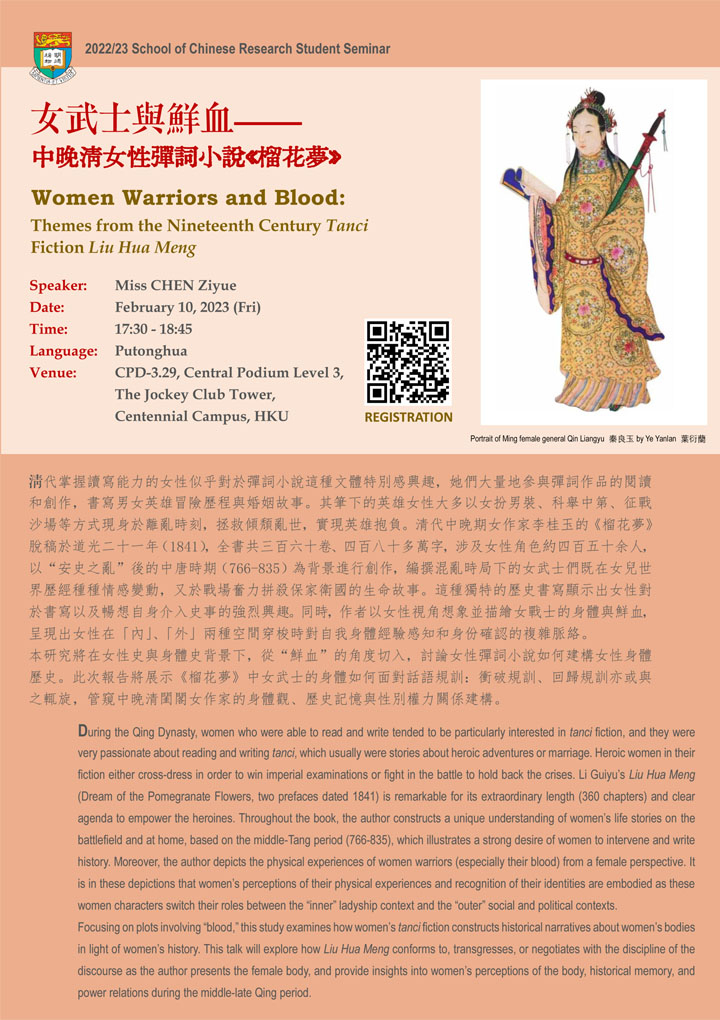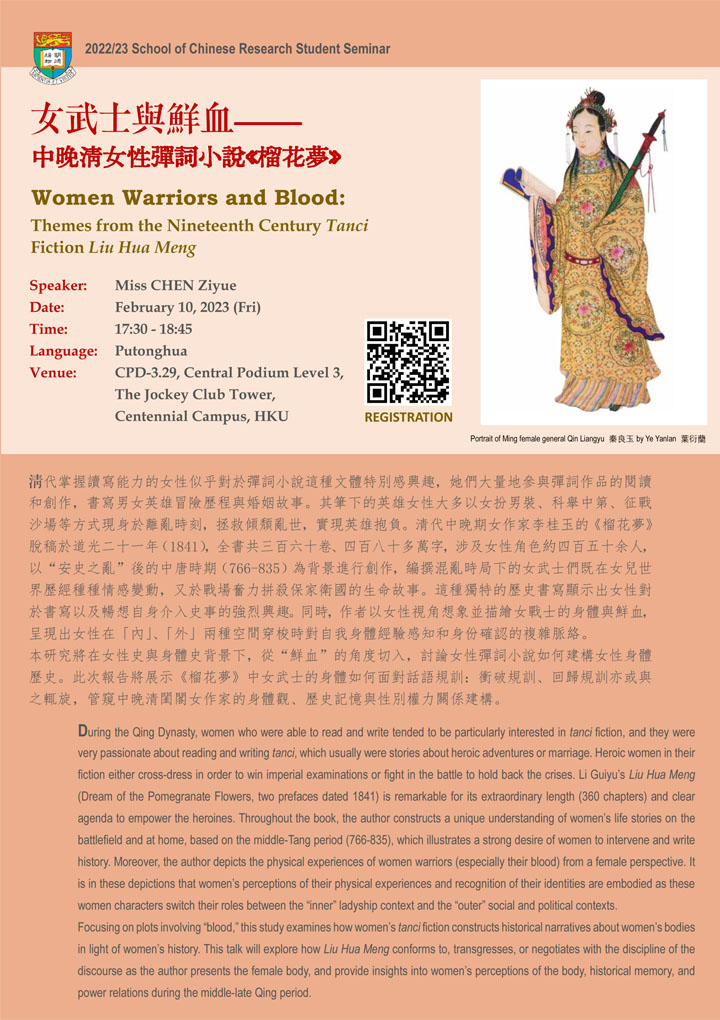女武士與鮮血—中晚清女性彈詞小說《榴花夢》 Women Warriors and Blood: Themes from the Nineteenth Century Tanci Fiction Liu Hua Meng

2022/23 School of Chinese Research Student Seminar
女武士與鮮血—中晚清女性彈詞小說《榴花夢》
Women Warriors and Blood: Themes from the Nineteenth Century Tanci Fiction Liu Hua Meng
Speaker: Miss CHEN Ziyue
Date & Time: February 10, 2023 (Fri) 5:30-6:45pm
Venue: CPD-3.29, Central Podium Level 3, The Jockey Club Tower, Centennial Campus, HKU
Language: Putonghua
Mode of Delivery: 100% Face-to-face
清代掌握讀寫能力的女性似乎對於彈詞小說這種文體特別感興趣,她們大量地參與彈詞作品的閱讀和創作,書寫男女英雄冒險歷程與婚姻故事。其筆下的英雄女性大多以女扮男裝、科舉中第、征戰沙場等方式現身於離亂時刻,拯救傾頽亂世,實現英雄抱負。清代中晚期女作家李桂玉的《榴花夢》脫稿於道光二十一年(1841),全書共三百六十卷、四百八十多萬字,涉及女性角色約四百五十余人,以“安史之亂”後的中唐時期(766-835)為背景進行創作,編撰混亂時局下的女武士們既在女兒世界歷經種種情感變動,又於戰場奮力拼殺保家衛國的生命故事。這種獨特的歷史書寫顯示出女性對於書寫以及暢想自身介入史事的強烈興趣。同時,作者以女性視角想象並描繪女戰士的身體與鮮血,呈現出女性在「內」、「外」兩種空間穿梭時對自我身體經驗感知和身份確認的複雜脈絡。
本研究將在女性史與身體史背景下,從“鮮血”的角度切入,討論女性彈詞小說如何建構女性身體歷史。此次報告將展示《榴花夢》中女武士的身體如何面對話語規訓:衝破規訓、回歸規訓亦或與之輒旋,管窺中晚清閨閣女作家的身體觀、歷史記憶與性別權力關係建構。
During the Qing Dynasty, women who were able to read and write tended to be particularly interested in tanci fiction, and they were very passionate about reading and writing tanci, which usually were stories about heroic adventures or marriage. Heroic women in their fiction either cross-dress in order to win imperial examinations or fight in the battle to hold back the crises. Li Guiyu’s Liu Hua Meng (Dream of the Pomegranate Flowers, two prefaces dated 1841) is remarkable for its extraordinary length (360 chapters) and clear agenda to empower the heroines. Throughout the book, the author constructs a unique understanding of women’s life stories on the battlefield and at home, based on the middle-Tang period (766-835), which illustrates a strong desire of women to intervene and write history. Moreover, the author depicts the physical experiences of women warriors (especially their blood) from a female perspective. It is in these depictions that women’s perceptions of their physical experiences and recognition of their identities are embodied as these women characters switch their roles between the “inner” ladyship context and the “outer” social and political contexts.
Focusing on plots involving “blood,” this study examines how women’s tanci fiction constructs historical narratives about women’s bodies in light of women’s history. This talk will explore how Liu Hua Meng conforms to, transgresses, or negotiates with the discipline of the discourse as the author presents the female body, and provide insights into women’s perceptions of the body, historical memory, and power relations during the middle-late Qing period.
ALL are welcome*
*Pre-registration (Click HERE) is requested.








